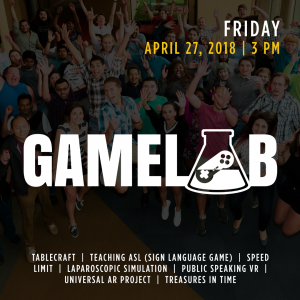While many students at The Florida Interactive Entertainment Academy (FIEA), UCF’s graduate video game development program, want to entertain the world by making the next “Call of Duty,” they also are making games that can change the world.
These educational games or “games for good” will be presented at UCF’s Center for Emerging Media on April 27 at 3 p.m.
The projects are part of professor Tom Carbone’s GameLab class, where students learn to develop games for non-entertainment purposes like education, simulation and social causes. All the students collaborated with a subject matter expert and this will be the first time the students present them to the public.
The games being demoed are “TableCraft,” “Teaching ASL,” “Speed Limit,” “Laparoscopic Simulation,” “Public Speaking VR Game,” “Universal AR Project” and “Treasures In Time.”
- “TableCraft” is a virtual reality game that teaches middle school students chemistry.
- “Teaching ASL” is a sign language game designed to teach beginning sign language.
- “Speed Limit” is a game using eye-tracking technology to teach law enforcement trainees to identify problems while driving.
- “Laparoscopic Simulation” is a VR game that simulates laparoscopic surgical removal of a kidney tumor.
- “Public Speaking VR Game” is a game where players practice giving effective presentations.
- “Universal AR Project” is a research game which overlays ghost characters into a real-world scene, allowing guests to try to capture ghosts as they try to hide in boxes.
- “Treasures in Time” is a game for a UCF Judaic studies class where players explore underground Jerusalem in search of artifacts.
The presentation is free and open to the public. Faculty, staff and students will be available to comment on any of the projects.
FIEA will be livestreaming daily interviews with the teams April 25-26 at 1 pm and 11 am on their Facebook page, www.facebook.com/ucffiea. The April 27 presentation will be livestreamed at FIEA’s YouTube channel, www.youtube.com/ucffiea.
